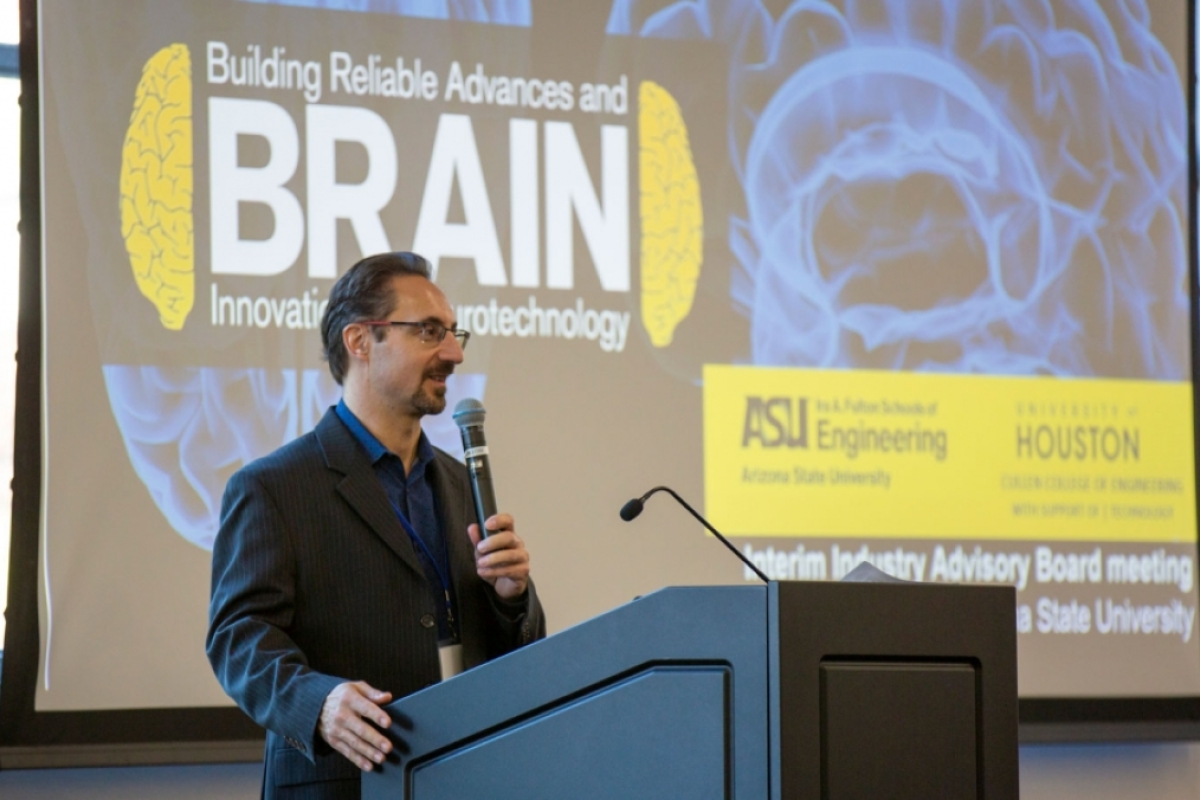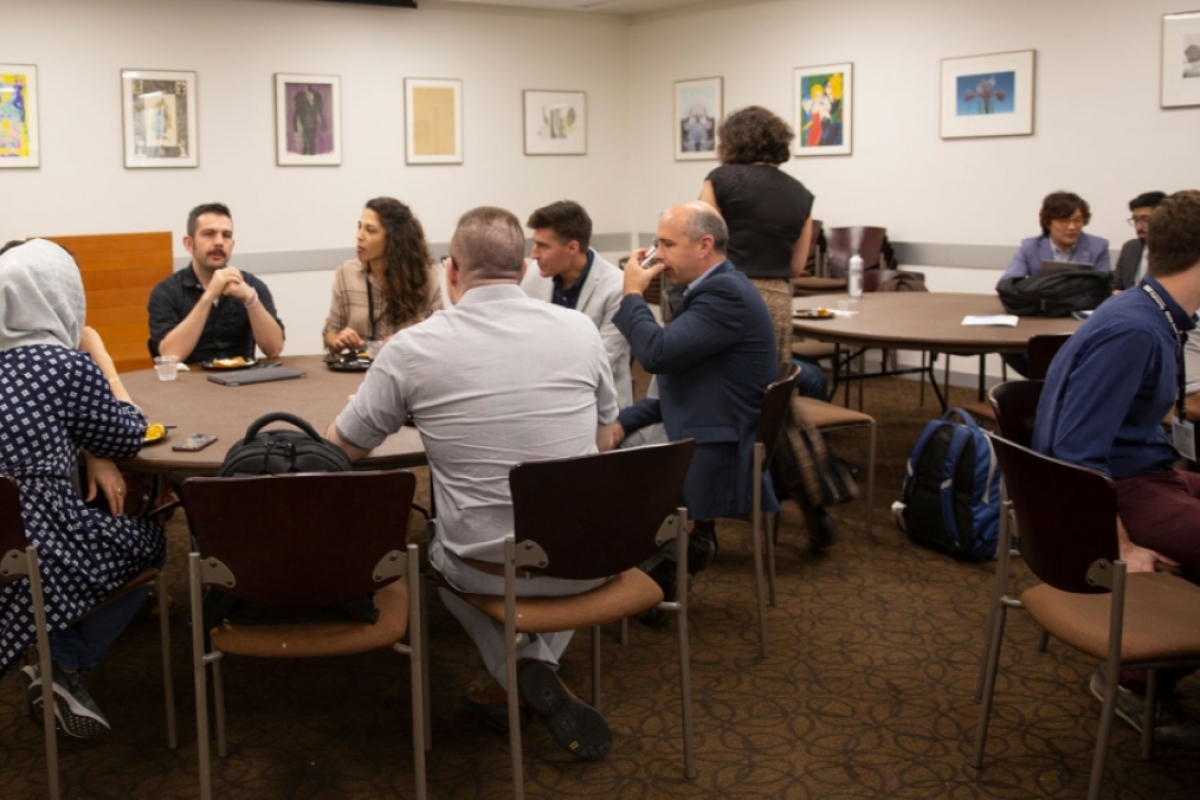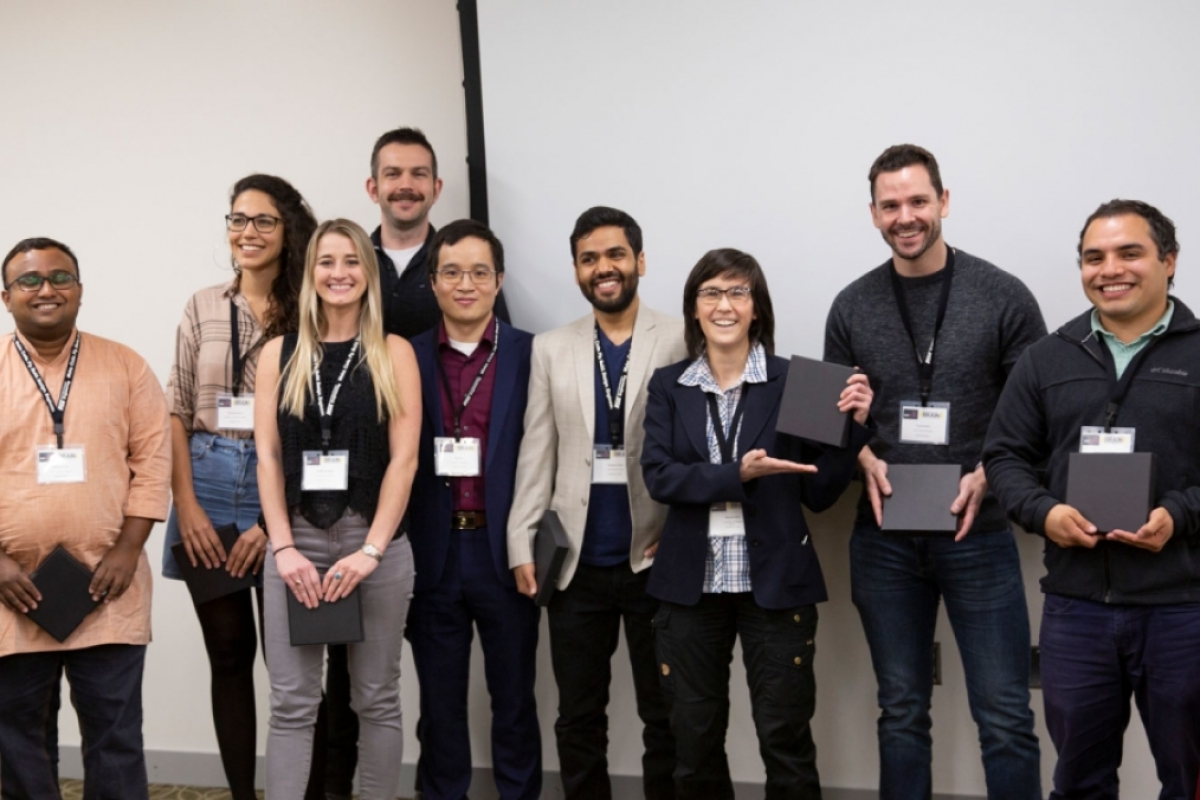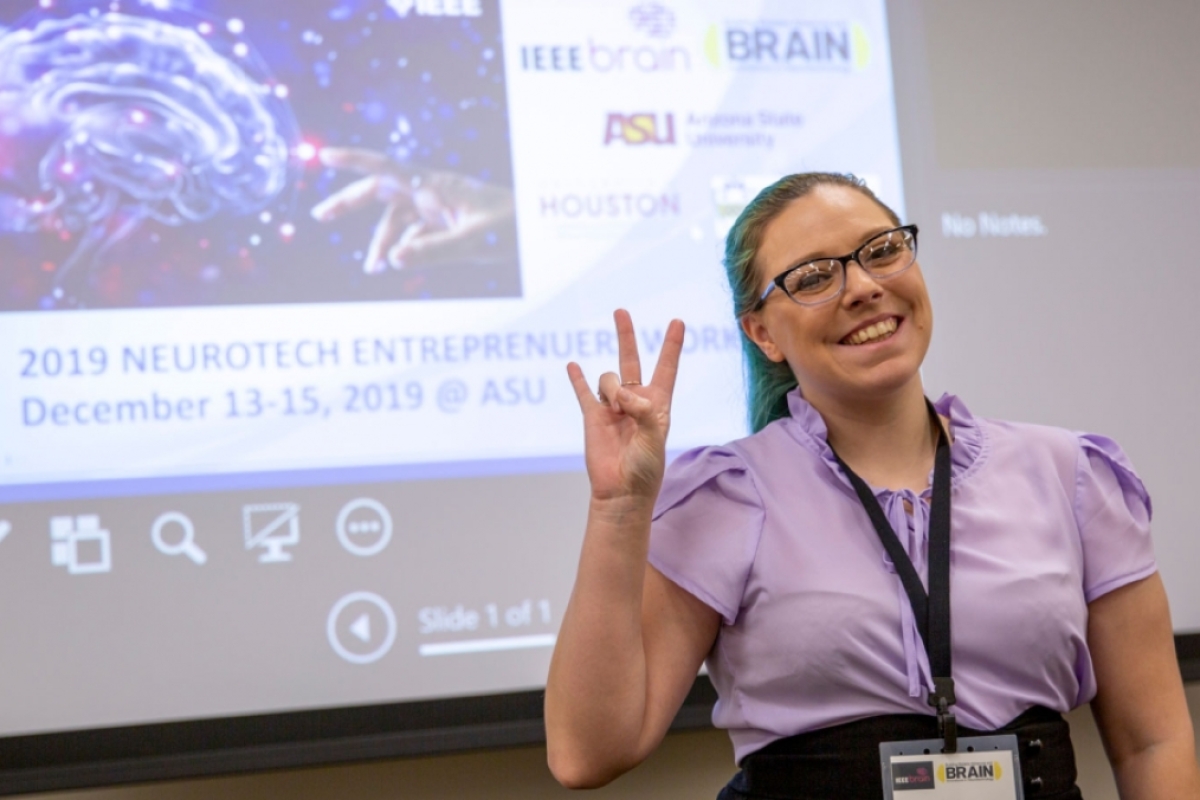Top students put heads together at ASU neurotech workshop
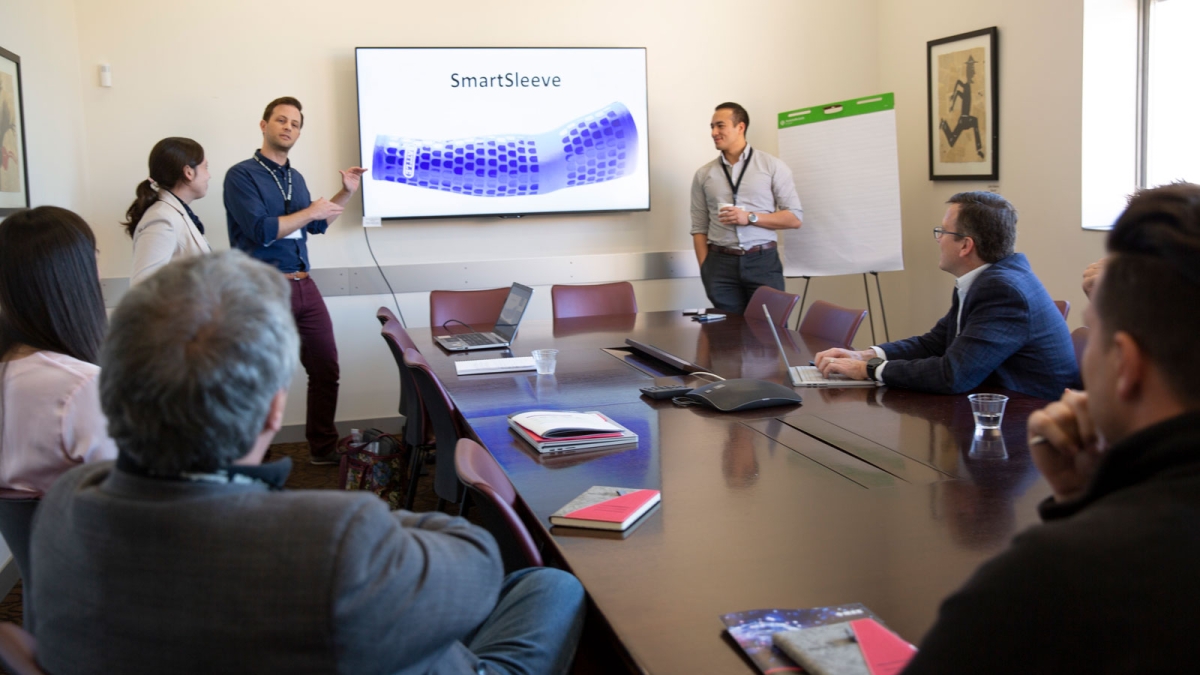
A team of graduate students pitches a product go-to-market strategy to judges who represented academia, industry and government in the first IEEE Brain Neurotech Entrepreneurs Workshop. The workshop brought together 30 top graduate students from around the world and neurotechnology investors and professionals from academia, industry and government to develop their entrepreneurial skills. Photographer: Erika Gronek/ASU
Arizona State University hosted the first IEEE Brain Neurotech Entrepreneurs Workshop Dec. 13–15 to inspire, empower and connect exceptional graduate students who aspire to be entrepreneurs.
The workshop, sponsored by the IEEE Brain initiative, drew 30 graduate students from seven countries for its first class of participants. Selected through a highly competitive application process that drew more than 100 interested students, the participants joined the workshop to develop entrepreneurial techniques that would help them be successful in their futures.
IEEE Brain seeks to facilitate collaboration and coordination across disciplines to advance neuroscience technology research, standardization and development to improve the human condition.
Sponsors Facebook Reality Labs, IEEE Entrepreneurship, Blackrock Microsystems and the Cleveland Functional Electrical Stimulation Center also helped cover travel expenses for students to enable them to participate.
Invited speakers and judges from key stakeholder groups in academia, industry and government offered advice and mentorship through presentations, panel discussions and breakout sessions on several topics.
“Partnerships with leaders in neurotechnology make it possible to develop the next generation of innovators through workshops like this one,” said Kyle Squires, dean of the Ira A. Fulton Schools of Engineering at ASU. “It was a valuable experience for our top neurotechnology faculty and graduate students to have the opportunity to network and learn from other top minds in the field from across the country and the world.”
Workshop builds on ASU’s strengths in neurotechnology and entrepreneurship
Marco Santello, professor and director of the School of Biological and Health Systems Engineering, directs the ASU-hosted Building Reliable Advances and Innovations in Neurotechnology, or BRAIN, Center together with Jose Contreras-Vidal at the University of Houston. This Industry/University Collaborative Research Center, encompassing collaboration among more than 50 researchers at multiple universities and 14 industry partners and hospital systems, was initially funded by the National Science Foundation with a $1.5 million grant in 2017.
The mission of the BRAIN Center is to develop safe, effective and affordable personalized neurotechnologies for diagnostics, restoration, enhancement and rehabilitation of sensory, motor, affective and cognitive functions. This mission is pursued by building collaborations between the center’s faculty and industry partners and support entrepreneurship in neurotechnology.
The BRAIN Center co-sponsored the event and was the main reason ASU was selected as host for the workshop.
“The goals of the workshop are well-aligned with the BRAIN Center’s mission, as well as ASU’s culture of innovation and entrepreneurship,” Santello said. “The workshop was designed to bring together leaders in neurotechnology industry, representatives from federal agencies and entrepreneurial students to discuss challenges and opportunities for translating academic research into commercial products.”
ASU’s wider neurotechnology initiatives include a recent partnership with Barrow Neurological Institute to create the Barrow-ASU Initiative for Innovation in Neuroengineering. The initiative aims to bring clinicians and engineers together to advance technology to treat neurological diseases and improve patient outcomes.
The university is establishing a track record of generating innovative neurotechnology startups, like Hoolest. The cranial-nerve modulation treatment company, co-founded by ASU biomedical engineering graduate student Nicholas Hool, won $100,000 in the 2017 ASU Innovation Open startup competition. The startup, which is developing a product aimed at helping people who experience anxiety attacks, continues to generate interest from investors. NeXST Rehab, one of the 2020 ASU Innovation Open semifinalists, is comprised of ASU students and students from universities on three continents who are creating the first at-home vagus nerve stimulator for stroke rehabilitation.
In addition to hosting competitions such as the ASU Innovation Open, ASU has infrastructure in place to help business-minded researchers commercialize their technology. Skysong Innovations, ASU’s intellectual property management company, has helped the university rise to become a top-performing academic institution for invention disclosures and startups. ASU Skysong Innovations Chief Patent Counsel Kyle Siegal served as a judge at the workshop and offered feedback to the budding entrepreneurs as a professional who executes patenting and licensing strategies with ASU researchers.
Arizona State University neurotech experts help lead workshop
ASU is home to world-class neurotechnology faculty, some of whom participated in the workshop.
James Abbas, an associate professor of biomedical engineering, is an expert in medical rehabilitation neural engineering techniques and technology and served as one of the workshop’s pitch presentation judges.
William “Jamie” Tyler, an associate professor of biomedical engineering, is highly active in entrepreneurial activities in the Phoenix metro area and mentored student teams at the workshop. At ASU, he develops noninvasive neuromodulation methods for brain health and human performance.
Marco Santello, professor and director of the School of Biological and Health Systems Engineering, one of the six Fulton Schools, welcomed participating students and professionals to the event. Santello is an expert in neural control of movement, sensorimotor learning, neuromodulation, neuroimaging and prosthetics.
Hands-on learning builds skills
The student participants were selected from a wide range of backgrounds and experience levels, and each brought their own diverse representation to their teams. Each team of three was randomly assigned a sample product to use for their investor pitches to keep the workshop focused on applying lessons learned.
Not only was the workshop for students, it was also planned and executed by students.
Student organizers, including Hool, designed the pitch competition, developed the products the teams would be given, moderated panel discussions and shared their own experiences as young entrepreneurs.
Simone Rodriguez, an MBA and mechanical engineering student at the University of Pittsburgh, suggested topics for the workshop based on her experience in business school. These topics included commercialization of research, funding opportunities and business development.
Students also met with mentors who represented a range of professions, including researchers, startup founders, nanotechnology industry executives, governmental employees and investors. Together, they discussed topics from stakeholder analysis and value proposition to ethics and pitching.
The three-day experience culminated with the development of a funding pitch a panel of judges. The teams were scored on the execution of their product value proposition, stakeholder analysis, market opportunity, competitive analysis advantage, go-to-market strategy, ethical considerations and presentation skills.
First place went to Jesus Cruz-Garza, University of Houston, Sharena Rice, University of Michigan, Yannick Roy, Université de Montréal, for their product pitch of a gaming system that utilizes eye-tracking computational methods for dyslexia rehabilitation.
ASU student Justin Tanner and his teammates Florencia Garro, Universidad Nacional de Córdoba, and Siddharth Nair, Indian Institute of Science, Bangalore, earned second place. Together they worked on a pitch for intracranial implants designed to relieve episodes for people with epilepsy.
In third place were Kai Yu, University of Minnesota, Noelle Jacobsen, University of Florida, and Kramay Patel, University of Toronto, who developed a pitch around neurostimulation technology for people with mental illnesses.
Each team was given feedback from the judges on what real investors would have liked and what might discourage investors from funding a product.
A valuable experience for entrepreneurial students
Kassondra Hickey, an ASU biomedical engineering graduate student who studies traumatic brain injury repair, was one of three graduate students from the host university to participate in the workshop. She was tasked with pitching a haptic robotic-assisted surgical device with team members Mehran Talebinejad, University of Ottawa, and Pablo Tostado Marcos, University of San Diego/Imperial College London.
“This was really challenging but exciting because it was so different,” Hickey said. “It empowered me to think, ‘If I can pitch a robot, I can pitch my expertise too.’”
Hickey says she found the workshop sessions to be immensely helpful, as she had never found useful resources on topics such as the avenues of raising funds, the different types of investors, realistic asks for seed finding and the stages and timeline of starting a business.
One of the most helpful parts of the workshop was near the start: an icebreaker where she had to pitch a random item revealed to her on the spot to the rest of the participants.
“It was scary but it helped me let go of my nerves and feel vulnerable, which you will be forced to do in many tough situations in life,” Hickey said.
The nerves carried over to their final presentation on their product, as they only had hours to come up with their pitch — unlike weeks or months as Hickey was used to.
Even with some technical difficulties and the short time to prepare, Hickey says it was a good experience.
“I surprised myself with my ability to push through and give a strong pitch with confidence,” Hickey said. “I was really out of my comfort zone, but I did it and I think that will only make things easier for me in the future.”
Hickey also enjoyed meeting and working with other graduate students who were interested in entrepreneurship.
“I felt really justified in my career goals knowing that there are other students in the same spot as me striving for the ambitious space of startup business,” Hickey said. “I feel that we can all support each other and learn from one another moving forward.”
More Science and technology

Will this antibiotic work? ASU scientists develop rapid bacterial tests
Bacteria multiply at an astonishing rate, sometimes doubling in number in under four minutes. Imagine a doctor faced with a…

ASU researcher part of team discovering ways to fight drug-resistant bacteria
A new study published in the Science Advances journal featuring Arizona State University researchers has found…

ASU student researchers get early, hands-on experience in engineering research
Using computer science to aid endangered species reintroduction, enhance software engineering education and improve semiconductor…
